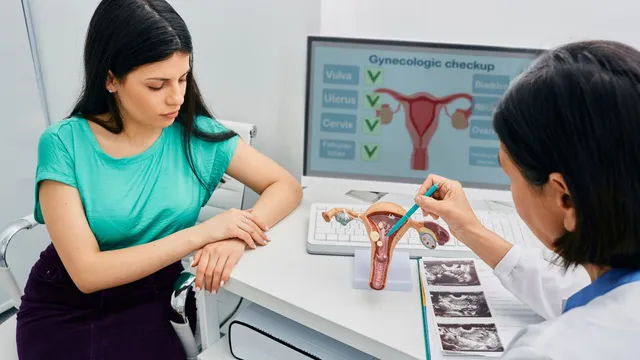- By Priyanka Munshi
- Sat, 23 Nov 2024 05:18 PM (IST)
- Source:JND
Regenerative medicine is gaining significant attention in this era, especially for its immense potential in addressing women’s health issues. Innovative approaches like stem cell therapy, exosome therapy, and cellular regeneration have proven appealing and effective in managing complex gynecological conditions where conventional medicine often falls short. These therapies offer women hope for overcoming challenges such as polycystic ovary syndrome (PCOS), infertility, and inflammatory gynecological disorders.
In a conversation with Jagran English, Dr. Pradeep Mahajan, a regenerative medicine researcher and founder of StemRx Hospital and Research Centre, elaborated on the role of regenerative medicine in women’s health. He discussed innovative solutions for gynecological conditions, emphasizing the need for cutting-edge therapies to improve quality of life.
The Role Of Regenerative Medicine In Women’s Health
Women face numerous health challenges, ranging from menstrual irregularities and difficulties in conceiving to hormonal imbalances and chronic distress. Conditions like infertility and PCOS are particularly challenging to treat, as conventional therapies primarily focus on symptom management rather than addressing underlying causes. Regenerative medicine offers a revolutionary approach by harnessing the body’s own ability to heal and regenerate damaged tissues, ultimately restoring functionality.
“Our goal with these therapies is to promote the repair of a patient’s own tissues,” explains Dr. Mahajan. “The extent of tissue injury, inflammatory response, and underlying condition determine how quickly a patient recovers.” Stem cell and exosome therapies, for example, work at the cellular level to reduce inflammation, regenerate tissues, and enhance ovarian function, particularly in conditions like PCOS and infertility.
Stem Cell Therapy: Revolutionizing Tissue Repair And Inflammation Control
Stem cell therapy is one of the most extensively researched aspects of regenerative medicine. Stem cells, which can differentiate into any cell type, play a crucial role in repairing and regenerating damaged tissues. In gynecological health, stem cell therapy has shown promise in reducing chronic inflammation associated with conditions such as endometriosis and PCOS, while improving reproductive organ function.
Also Read: Myths vs Facts: Doctor Debunks Myths Around IVF Success Rates For PCOS/PCOD Patients
Dr. Mahajan highlights the potential of stem cells: “These cells act as templates for the body, stimulating repair in damaged tissues. For chronic conditions unresponsive to traditional treatments, stem cells bring inflammatory markers into balance, alleviating symptoms like irregular menstrual cycles and metabolic disturbances. Additionally, they enhance follicular development within the ovaries, improving conception rates in patients with infertility issues.”
Exosome Therapy: Fine-Tuning The Body’s Communication System
Exosome therapy is another groundbreaking regenerative approach. Exosomes, bioactive vesicles produced by multivesicular bodies (MVBs), play a key role in intercellular communication. Rich in proteins, lipids, and genetic material, exosomes can target damaged tissues and activate the healing process.
“Exosomes are revolutionary,” says Dr. Mahajan. “While stem cells hold regenerative potential, exosomes provide bioactive signals to adjacent cells, triggering immunoregulatory and healing responses.” In conditions like PCOS, exosome therapy helps restore ovarian hormone production, balance immune responses, and reduce cystic ovarian changes, improving reproductive health.
Enhancing Ovarian Function For Infertility And PCOS
Regenerative medicine focuses not just on alleviating pain but also on restoring normal physiological processes. Stem cell and exosome therapies have been particularly effective in enhancing ovarian function, which is often disrupted by hormonal imbalances or inflammation. These advancements reduce the need for surgical interventions and prolonged therapies.
Stem cells have successfully restored ovarian tissue and improved egg quality in women with premature ovarian failure or low ovarian reserve. Complementing this, exosome therapy reduces inflammation and promotes hormonal balance, both essential for conception. “We’re advancing therapies that improve ovarian function without surgical options,” notes Dr. Mahajan. “This can significantly increase fertility chances.”
A Future Of Patient-Centered, Regenerative Solutions
Regenerative medicine offers a patient-centered approach, focusing on resolving the root causes of chronic inflammation, fibrosis, and endocrine dysfunction. These therapies provide lasting relief and improve the overall quality of life for women suffering from gynecological conditions. As Dr. Mahajan points out, “Women’s health has historically been undervalued in medicine. Regenerative medicine empowers women with the tools they need to maintain health, vitality, and wellness.” With its transformative potential, regenerative medicine is paving the way for a brighter, healthier future for women worldwide.

